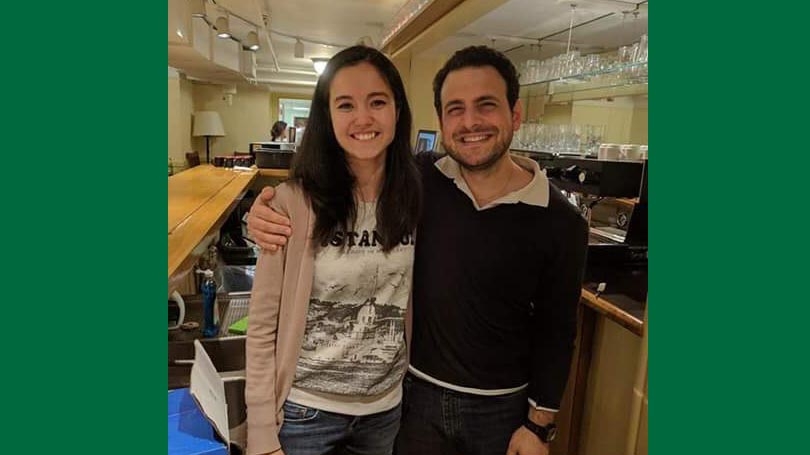
Selbi Nuryyeva with International Graduate Mentoring Program Co-Chair, Gilbert Rahme
Selbi Nuryyeva, a chemistry graduate student at Dartmouth in the lab of Professor Ivan Aprahamian, recently had her groundbreaking research on a drug for Malaria published in Nature Communications. At Dartmouth, Nuryyeva conducts research on molecular machines, an area of chemistry that won the Nobel Prize this year. Her interest in research began during her undergraduate career at NYU Abu Dhabi where she took advantage of several extracurricular research opportunities. With Professor Ali Trabolsi (NYU Abu Dhabi) she studied materials ranging from photochromic smart windows to polymers that could instantly absorb dyes from water. During her junior year at NYU Abu Dhabi, Nuryyeva won a research-funding award to spend a summer at the University of Strasbourg in France under the direction of Dr. Mourad Elhabiri. Her studies in France were what resulted in the publication of “Arylmethylamino steroids as antiparasitic agents” in Nature Communications in January of 2017.
Malaria-causing parasites first enter the bloodstream from infected mosquitos and then migrate to the liver. There, they infect liver cells where they multiply and mature, ending in the rupture of any infected liver cells. After the liver cells rupture, the parasites re-enter the bloodstream and infect red blood cells. Inside the red blood cells, the parasite feeds on hemoglobin. However, in the process of digesting hemoglobin, heme is released and this is toxic to the parasite. To survive, the parasites clump the hemes together in a process called crystallization. The drug proposed in Nuryyeva’s publication binds to heme so that it cannot be crystallized, which results in toxicity and death of the parasite.
In developing this drug, there were two main aspects to consider: the ability of the drug to release heme and the ability of the drug to enter the membrane of red blood cells. To solve this problem, the drug was designed to have two functional parts 1) the arylmethylamino and 2) the steroid. The arylmethylamino group binds and thereby releases the heme and the steroid, a hydrophobic compound that mixes well with lipids, can easily enter the lipid-based cell membrane. Nuryyeva’s role was to test the binding of various arylmethylamino groups to heme using ultraviolet-visible spectroscopy and mass spectrometry.
In addition to her success in scientific research, Nuryyeva volunteers her time to lead the International Graduate Student Mentoring Program (IGMP) at Dartmouth, a graduate-student organization that facilitates the transition of incoming international students into Dartmouth community. As an international student from Turkmenistan, Nuryyeva aspires to advance her professional training in the U.S. with an eventual goal of transferring those skills into her home country. However, she and many other international students recognize the stress that comes with the increased uncertainty in the U.S. with regards to immigration.
To help combat the difficulties that may arise for international students, IGMP works with the School of Graduate and Advanced Studies to help international students feel at home in Hanover and the Upper Valley. Each international student participating in the IGMP is assigned to two current students who orient them to the town. Nuryyeva feels that having an international student community cultivates empathy and understanding for the problems commonly faced by international students – such as fluency in English, or navigating cultural differences.
For more information about the recent executive orders and resources offered at Dartmouth, please go to the Office of Visa and Immigration Services website. If you would like to get involved in IGMP, visit their website and leave a reply or email the current president, Gilbert Rahme